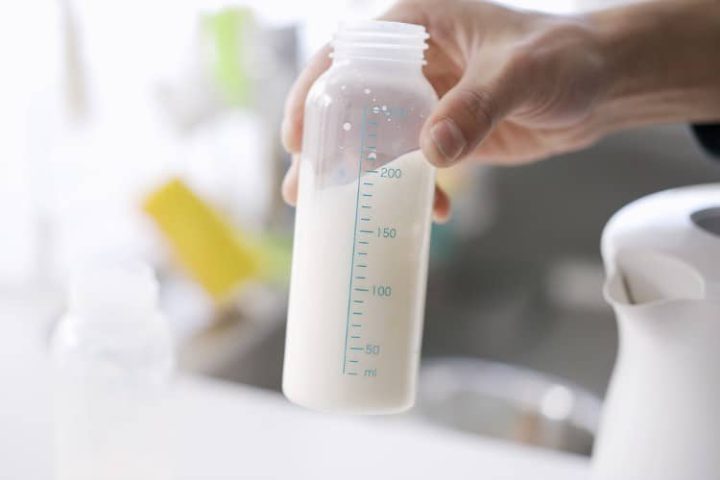
Grappling with the self-inflicted nationwide supply shortage of baby formula, the Biden administration announced Wednesday that it will be importing one billion pounds of this product from Mexico starting Friday.
The announcement posted on the White House website reads,
Today, President Biden is announcing that his Administration is sourcing trucking, facilitated by the U.S. Department of Health and Human Services (HHS), for Operation Fly Formula to transport Gerber infant formula from Mexico to Fort Worth, Texas starting on June 24. This delivery will include approximately 1 million pounds of Gerber Good Start Gentle infant formula, the equivalent of approximately 16 million 8-ounce bottles. The product will be available through retail channels.
Besides the HHS, other federal bodies participating in the “Operation Fly Formula” include the U.S. Department of Agriculture (USDA), the General Services Administration (GSA), and the Department of Defense (DOD). All of them have teamed up “to pick up overseas infant formula that meets U.S. health and safety standards, so it can get to store shelves faster,” per the White House.
As a result of the “operation,” the administration expects that by June 26, 32 flights and almost 19 million eight-ounce bottle equivalents of infant formula will have been brought into the country.
The news was rather an ironic development given that the administration was caught sending scarce baby formula to illegal-immigrant detention centers, which remained among the only places in America where supplies of the taxpayer-subsidized product remained fully stocked.
The administration also bragged that it had previously invoked the Defense Production Act. As reported by The New American on the matter, the administration ordered suppliers of the ingredients used in baby formula production to send it to baby-formula producers, even though the same ingredients could have been ordered by other companies. In addition, the administration had ordered the HHS and USDA to import infant formula from overseas — if it met U.S. health and safety standards.
“While the U.S. has turned to imports for many consumer goods, baby formula has not been among those goods in the past, with almost 100 percent of baby formula consumed in the U.S. being manufactured in the U.S.,” noted the report.
Simultaneously, the Food and Drug Administration (FDA) on May 10 moved to ease federal import regulations to facilitate the shipments of the formula from other countries. That included the following measures:
• Expediting the necessary certificates to allow for flexibility in the movement of already permitted products from abroad into the U.S.
• Offering a streamlined import entry review process for certain products coming from foreign facilities with favorable inspection records.
• Exercising enforcement discretion on minor labeling issues for both domestic and imported products to help increase volume of product available as quickly as possible.
The agency suggested that, as always, no quality and safety standards would be jeopardized.
On May 12, the White House released a statement outlining steps to boost formula supply, including getting more formula from overseas, cracking down on price gouging, and expanding availability for low-income families.
The first foreign shipment of baby formula arrived from Europe on May 22 and included 132 pallets of formula. To bring that precious cargo to the United States, the administration deployed a military C-17 cargo plane. “The formula originated from Zurich, Switzerland, and was trucked to Germany, where it was loaded on the C-17 and flown to the US,” reported CNN.
Other shipments followed within the next few weeks. One of the largest came from Australia, providing 190,000 pounds of formula to American grocery chains Kroger and Albertsons Companies.
Asked by CNN how the United States found itself in a position that it needs to import baby formula, National Economic Council Director Brian Deese said that market consolidation was to blame, mostly. “It goes back to this question of how we can bring more competition in our economy, have more providers have this formula so that no individual company has this much control over supply chains,” he said.
There are four companies in the infant formula manufacturing industry — Abbott Laboratories, Mead Johnson, Perrigo Company PLC, and Nestle USA — that cover 90 percent of the U.S. market.
The crisis, however, was arguably government-created.
The United States has been grappling with a shortage of baby formula that started due to supply-chain problems during the pandemic-related business closures. It was drastically exacerbated by the closure of the nation’s largest formula factory, Abbott Laboratories, in connection with a deadly bacteria scare in February 2022.
Abbott shut down its Sturgis, Michigan, plant in February after the FDA opened an investigation into links between formula produced at the plant and four cases of infants contracting bacterial infections. The plant reopened in early June after reaching an agreement with the FDA in May. Yet it said it would take up to eight weeks for new formula production to reach store shelves.
The plant, however, had to pause production in mid-June because of a flood that damaged some parts of the facility.
As reported by The Detroit News, “A ‘significant storm event’ triggered several intervals of heavy rainfall over a short period of time, briefly putting the storm sewer system at capacity, according to a statement from the city.”
In the meantime, the out-of-stock rate of baby formula reached new highs nationwide for the week ending May 29, reportedly rising to 73.58 percent.




